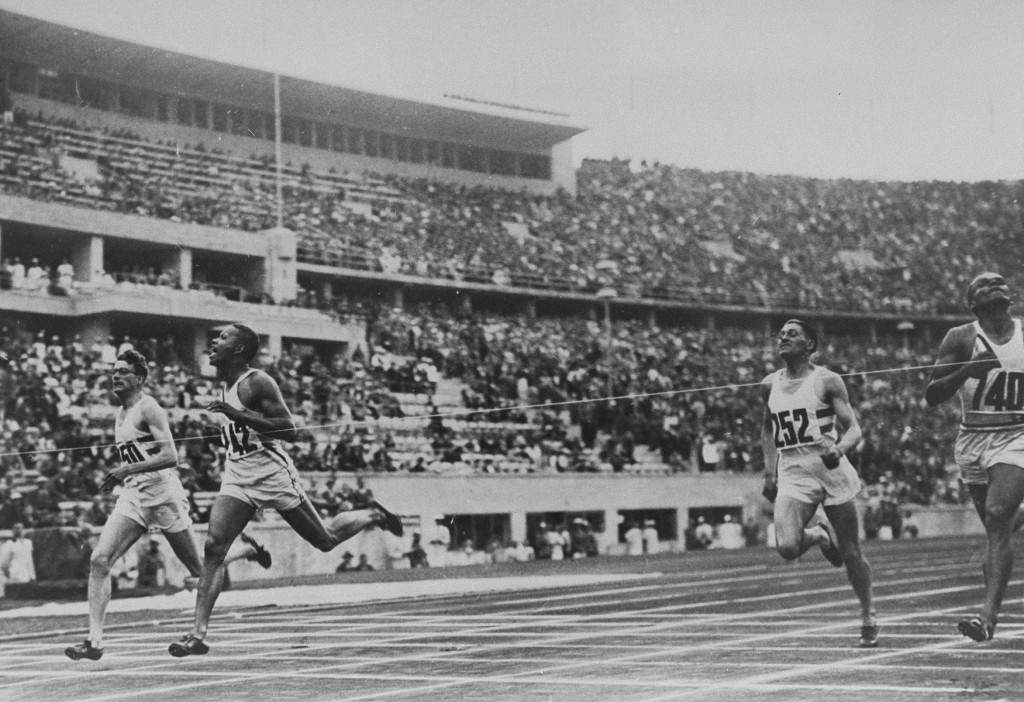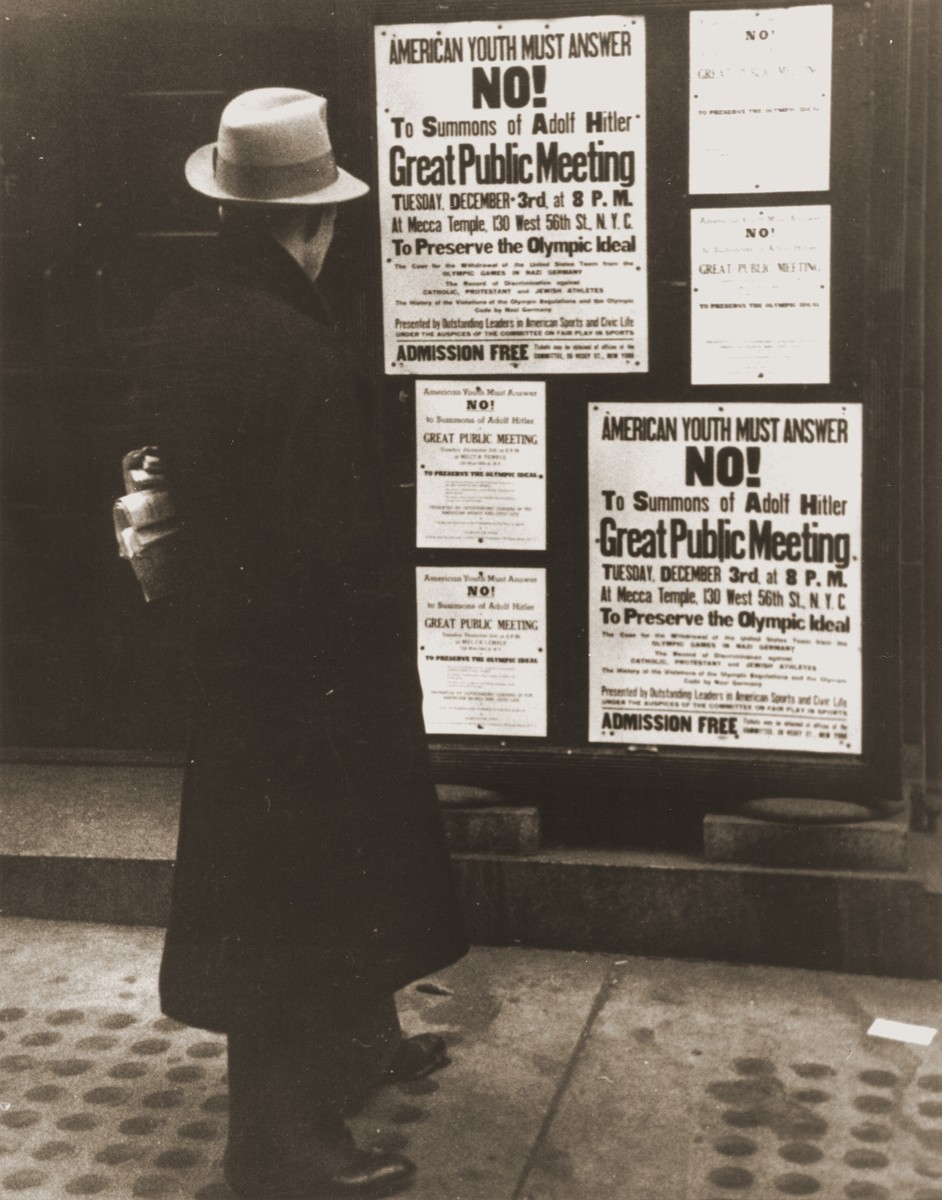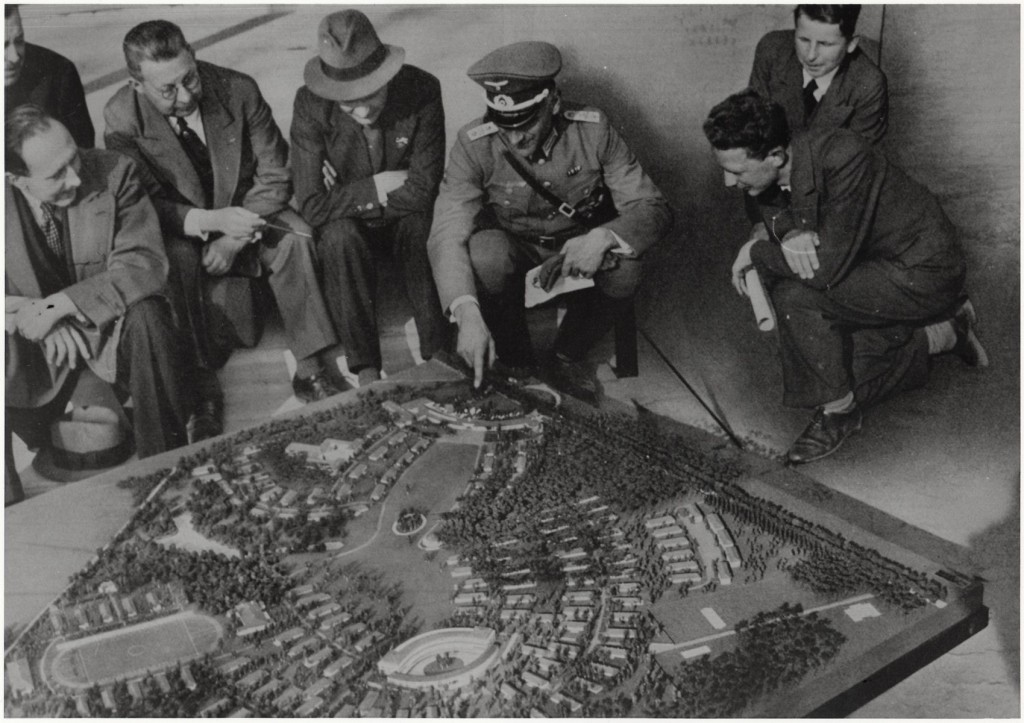
The Movement to Boycott the Berlin Olympics of 1936
After the Nazi seizure of power in Germany in 1933, the United States and other western democracies began to question the morality of supporting the Olympic Games hosted by the regime.
Key Facts
-
1
Debate over participation in the 1936 Olympics was greatest in the United States, which traditionally sent one of the largest teams to the Games. Some athletes believed the best way to combat Nazi views was to defeat them in the Olympic arena.
-
2
Supporters of the boycott believed that participating in the Games would represent an endorsement of Hitler's Reich.
-
3
The boycott movement ultimately failed, following a heated nationwide debate in the United States.
Background

Adolf Hitler took power in Germany in 1933. Observers in the United States and other western democracies soon began to question the morality of supporting Olympic Games hosted by the Nazi regime.
Responding to reports of the persecution of Jewish athletes in 1933, Avery Brundage, president of the American Olympic Committee (AOC), stated: "The very foundation of the modern Olympic revival will be undermined if individual countries are allowed to restrict participation by reason of class, creed, or race."
Brundage, like many others in the Olympic movement, initially considered moving the Games from Germany. After a brief and tightly managed inspection of German sports facilities in 1934, Brundage stated publicly that Jewish athletes were being treated fairly and that the Games should go on, as planned.
The Boycott Debate in the United States
Debate over participation in the 1936 Olympics was greatest in the United States, which traditionally sent one of the largest teams to the Games. By the end of 1934, the lines on both sides were clearly drawn.
Avery Brundage
Avery Brundage opposed a boycott, arguing that politics had no place in sport. He fought to send a US team to the 1936 Olympics, claiming: "The Olympic Games belong to the athletes and not to the politicians." He wrote in the AOC's pamphlet "Fair Play for American Athletes" that American athletes should not become involved in the present "Jew-Nazi altercation."
As the Olympics controversy heated up in 1935, Brundage alleged the existence of a "Jewish-Communist conspiracy" to keep the United States out of the Games.
Jeremiah Mahoney
Judge Jeremiah Mahoney, president of the Amateur Athletic Union, led efforts to boycott the 1936 Olympics. He pointed out that Germany had broken Olympic rules forbidding discrimination based on race and religion. In his view, participation would indicate an endorsement of Hitler's Reich.
Mahoney was one of a number of Catholic leaders supporting a boycott. New York mayor Fiorello La Guardia, New York governor Al Smith, and Massachusetts governor James Curley also opposed sending a team to Berlin. The Catholic journal The Commonweal (November 8, 1935) advised boycotting an Olympics that would set the seal of approval on radically anti-Christian Nazi doctrines.
Ernst Lee Jahncke
Another important boycott supporter, Ernst Lee Jahncke (a former assistant secretary of the US Navy), was expelled from the International Olympic Committee (IOC) in July 1936 after taking a strong public stand against the Berlin Games. The IOC pointedly elected Avery Brundage to fill Jahncke's seat. Jahncke is the only member in the 100-year history of the IOC to be ejected.
Franklin D. Roosevelt
President Franklin D. Roosevelt did not become involved in the boycott issue, despite warnings from high-level American diplomats regarding Nazi exploitation of the Olympics for propaganda purposes. Roosevelt continued a 40-year tradition in which the American Olympic Committee operated independently of outside influence. Both the US ambassador to Germany, William E. Dodd, and George Messersmith, head of the US Legation in Vienna, deplored the American Olympic Committee's decision to go to Berlin.

Boycott Efforts in Other Countries
Short-lived boycott efforts also surfaced in Great Britain, France, Sweden, Czechoslovakia, and the Netherlands. German Socialists and Communists in exile voiced their opposition to the Games through publications such as Arbeiter Illustrierte Zeitung (The Worker Illustrated Newspaper). Some boycott proponents supported counter-Olympics. One of the largest was the "People's Olympiad" planned for summer 1936 in Barcelona, Spain. It was canceled after the outbreak of the Spanish Civil War in July 1936, just as thousands of athletes had begun to arrive.
Choices of Individual Athletes
Individual Jewish athletes from a number of countries also chose to boycott the Berlin Olympics. In the United States, some Jewish athletes and Jewish organiztions like the American Jewish Congress and the Jewish Labor Committee supported a boycott of the Berlin Games.
The Decision to Participate
Many American newspaper editors and anti-Nazi groups, led by Jeremiah Mahoney, president of the Amateur Athletic Union, were unwilling to accept Nazi Germany's hollow pledges regarding German Jewish athletes. But a determined Avery Brundage maneuvered the Amateur Athletic Union to a close vote in favor of sending an American team to Berlin, and, in the end, Mahoney's boycott effort failed.
Once the Amateur Athletic Union of the United States voted for participation in December 1935, however, other countries fell in line.
Forty-nine teams from around the world competed in the Berlin Games, more than in any previous Olympics.
Critical Thinking Questions
What were the key issues for each side in the boycott? What pressures and motivations affected organizers and athletes?
Investigate other instances of boycotts of the Olympics.
Are international boycotts intended to change behavior, attitudes, or policy?

